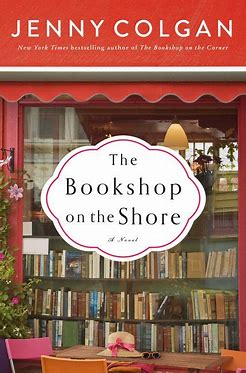I stopped reading commercial fiction because I stopped trusting the author to transport me. I had stumbled on too many flaws: holes in the plot, predictable narrative structure, wooden characters, harm to women and children as an engine of plot, outmoded models of womanhood, failure to challenge the status quo, etc. If the whole point of reading commercial fiction is guilty pleasure, too much of the pleasure had had to give way to tripping on what had appeared to me to be glaring mistakes of craft or politics.
Then Jenny Colgan came into my hands, placed there by Marian Misters at The Sleuth of Baker Street. Hurrah for hand-sold books from independent booksellers!
I had gone in looking for a mystery that featured trees. It’s an odd ask, I know, but I was reading The Overstory by Richard Powers and just loving it. I wanted that plus murder mystery.
Marian suggested a mystery set in a bookstore with a tree growing inside it. SOLD. Bookshop as setting pretty much guarantees reading pleasure, right? She warned me, though, that the book contained magic. She was right to warn me. I enjoyed the book, I even enjoyed it enough to go back the next day and buy the next installment, but I’m done now.
When I enthused about the bookstore setting, Marian also suggested Jenny Colgan’s The Bookshop on the Shore, and this is a book I not only enjoyed but can wholeheartedly endorse. There are some snags of chronology, the narrative structure is not at all innovative, there is a heteronormative romance with the predictable push/pull of attraction, harm to children is an engine of plot, and there is–spoiler alert–a happy ending. None of this mattered because it was all done deftly, and I was utterly swept up, and then I went out and bought three more of her books (The Bookshop on the Corner, the first in the series, and her two boarding school books, Class and Rules, which I enjoyed enough, but I’m probably done now.)

So, the matter of trust, it turns out, is not about the author but the genre, and I found an author I trust. Jenny Colgan delivers a good, guilty pleasure. Her female protagonists are feisty and independent, and that’s enough to counter any arguments I might have with other aspects of the genre.
And the bookish ingredients are wonderful. Her booksellers are really good at putting the right book in a lost reader’s hand. Her narrator is really spot on about the fallout from cuts to library services, about the very slim margins in bookselling and about the precarious balance of a bookshop’s quality assurance and ability to stay afloat. The mobile bookshop creates community wherever it goes. There is a jaw-dropping private library around which a whole manor is built. Some of the bookish content is trenchant commentary and some of it is utterly romantic, but there are actual lives to be saved and transformed by books–selling them, reading them, recommending them.
Obviously, it was the bookish ingredients that brought me to these books, but it was such a delight to revel in the joys of commercial fiction. I took comfort in the assured structure. I loved the happy ending. I longed for the book-loving hero to sweep the book-loving heroine off of her feet.
And I’m now on the lookout for more excellent authors of commercial fiction who will sweep me off my feet.
If you’re tempted to read these, and if it matters to you to read in order, begin at the beginning with The Bookshop on the Corner.
::
This post is brought to you by Kerry Clare, who pushed me back to blogging with her Blog School. Check it out.
Leave a comment